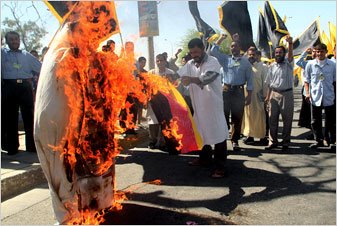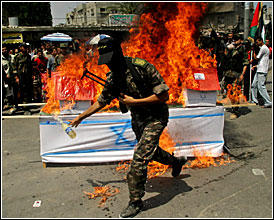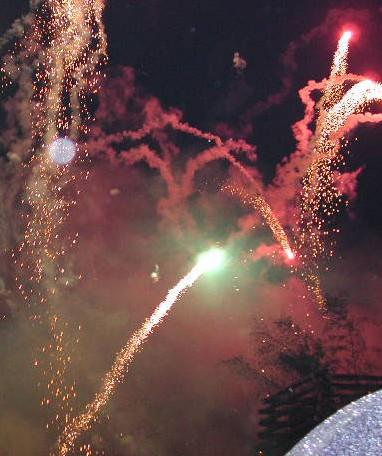Friday, September 22, 2006
Shanah Tovah

May you be blessed with the most unimaginably wonderful year, in good health, prosperity, and great joy! May you be blessed that your jokes are really funny!
Monday, September 18, 2006
Pope's Apology Is Called Inadequate

Essam Al-Sudani/AFP -- Getty Images
Pope’s Apology Is Called Inadequate
Protests continued over Pope Benedict XVI's comments on Islam last week. To the right, Iraqis burned an effigy of the pope today in Basra.
I am reminded of a cartoon pasted on the counter at the local copy place. The cartoon shows the counter clerk at the print shop dealing with an irrate customer after the printer made an error -- The clerk said to the customer: "What would it take to make everything good? Would it be OK if we reprinted the job for free, refunded your deposit, and shot the printer?"
Gaza abandoned to lawlessness, corruption, and hope
Originally posted 8/22/2005
FIERY PROTEST: An Islamic Jihad masked gunman sets a model of a Jewish settlement on fire during a rally at Rafah refugee camp in the southern Gaza Strip Monday. After the settlements are evacuated, Israel is to turn Gaza over to Palestinian control. -- photo/text copyright AP
August 21, 2005 copyright NY Times
The Dispossessed
By ELIE WIESEL
IN 1991, when Saddam Hussein's Scud missiles fell in a deafening din on Tel Aviv, some Palestinians danced in the streets and on the roofs of their houses. I saw them. I was in Jerusalem, and I could see what was happening in the Arab quarter of the Old City. It happened again later, each time a suicide terrorist set off a bomb on a bus or in a restaurant. I evoke these scenes with sadness, and for a reason: we have just seen them repeated in Gaza.
The images of the evacuation itself are heart-rending. Some of them are unbearable. Angry men, crying women. Children, led away on foot or in the arms of soldiers who are sobbing themselves.
Let's not forget: these men and women lived in Gaza for 38 years. Successive governments, from the left and the right, encouraged them to settle there. In the eyes of their families, they were pioneers, whose idealism was to be celebrated.
And here they are, obliged to uproot themselves, to take their holy and precious belongings, their memories and their prayers, their dreams and their dead, to go off in search of a bed to sleep in, a table to eat on, a new home, a future among strangers.
From far away, we watch them on television screens and in the pages of newspapers. Some have behaved in an offensive and undignified manner. They insulted and wounded soldiers; they spat on officers - including some who are decorated heroes, all of them ready to give their lives for their country. But the majority have responded in a dignified way: with tears. As though united in the same despair, soldiers and evacuees cried together, even to such an extent that certain commentators have reproached them, saying: our warriors of yesterday and tomorrow shouldn't give way to easy emotion.
On a strictly military level, the operation is a success. For that, and for his brave decision to pursue future peace even at present political cost, Prime Minister Ariel Sharon deserves praise. But starting now, Israelis and Palestinians must face the question: What next?
And here I am obliged to take a step back. In the tradition I claim, the Jew is ordered by King Solomon "not to rejoice when the enemy falls." I don't know whether the Koran suggests the same.
I know only that in my opinion, what is missing from the chapter now closing is a collective gesture that ought to be made, but that hasn't been made, by the Palestinians.
Let's imagine it, if you will. Let's imagine that, faced with the tears and suffering of the evacuees, the Palestinians had chosen to silence their joy and their pride, rather than to organize military parades with masked fighters, machine guns in hand, shooting in the air as though celebrating a great battlefield victory. Yes, imagine that President Mahmoud Abbas and his colleagues, in advising their followers, extolled moderation, restraint, respect and a little understanding for the Jews who felt themselves struck by an unhappy fate. They would have won general admiration.
I will perhaps be told that when the Palestinians cried at the loss of their homes, few Israelis were moved. That's possible. But how many Israelis rejoiced?
And now, where are we? A lull is imperative. The tears must be allowed to dry and the wounds to heal. Haste, in this delicate moment, is dangerous. Any pressure from outside risks being counterproductive.
Why these words of warning? Because last May, at an official dinner offered by King Abdullah II of Jordan, I spoke with the Palestinian prime minister, Ahmed Qurei. When I asked him what he thought of Mr. Sharon's courageous decision regarding Gaza, it was with a wave of the hand that he objected, adding with disdain: "All that is worth nothing, means nothing. If Sharon doesn't begin right away to negotiate definitive borders, a great catastrophe will be the result." He repeated those words: "right away" and "a great catastrophe."
The optimist in me wants very much to believe that those were just words. Gaza, after all, is but one chapter in a book that must ultimately be about peace.
Elie Wiesel, a professor of humanities at Boston University, was awarded the Nobel Peace Prize in 1986. This article was translated from the French by The New York Times.
There have been, of course, other chapters in the book. And the authority of Israel over Gaza, understandably necessary for security, has left many questions of Gaza's future relationships with Israel and Egypt unanswered. May we be blessed that our prayers and hopes for peace prevail over the lawlessness, corruption, and hateful speech of the present.

FIERY PROTEST: An Islamic Jihad masked gunman sets a model of a Jewish settlement on fire during a rally at Rafah refugee camp in the southern Gaza Strip Monday. After the settlements are evacuated, Israel is to turn Gaza over to Palestinian control. -- photo/text copyright AP
August 21, 2005 copyright NY Times
The Dispossessed
By ELIE WIESEL
IN 1991, when Saddam Hussein's Scud missiles fell in a deafening din on Tel Aviv, some Palestinians danced in the streets and on the roofs of their houses. I saw them. I was in Jerusalem, and I could see what was happening in the Arab quarter of the Old City. It happened again later, each time a suicide terrorist set off a bomb on a bus or in a restaurant. I evoke these scenes with sadness, and for a reason: we have just seen them repeated in Gaza.
The images of the evacuation itself are heart-rending. Some of them are unbearable. Angry men, crying women. Children, led away on foot or in the arms of soldiers who are sobbing themselves.
Let's not forget: these men and women lived in Gaza for 38 years. Successive governments, from the left and the right, encouraged them to settle there. In the eyes of their families, they were pioneers, whose idealism was to be celebrated.
And here they are, obliged to uproot themselves, to take their holy and precious belongings, their memories and their prayers, their dreams and their dead, to go off in search of a bed to sleep in, a table to eat on, a new home, a future among strangers.
From far away, we watch them on television screens and in the pages of newspapers. Some have behaved in an offensive and undignified manner. They insulted and wounded soldiers; they spat on officers - including some who are decorated heroes, all of them ready to give their lives for their country. But the majority have responded in a dignified way: with tears. As though united in the same despair, soldiers and evacuees cried together, even to such an extent that certain commentators have reproached them, saying: our warriors of yesterday and tomorrow shouldn't give way to easy emotion.
On a strictly military level, the operation is a success. For that, and for his brave decision to pursue future peace even at present political cost, Prime Minister Ariel Sharon deserves praise. But starting now, Israelis and Palestinians must face the question: What next?
And here I am obliged to take a step back. In the tradition I claim, the Jew is ordered by King Solomon "not to rejoice when the enemy falls." I don't know whether the Koran suggests the same.
I know only that in my opinion, what is missing from the chapter now closing is a collective gesture that ought to be made, but that hasn't been made, by the Palestinians.
Let's imagine it, if you will. Let's imagine that, faced with the tears and suffering of the evacuees, the Palestinians had chosen to silence their joy and their pride, rather than to organize military parades with masked fighters, machine guns in hand, shooting in the air as though celebrating a great battlefield victory. Yes, imagine that President Mahmoud Abbas and his colleagues, in advising their followers, extolled moderation, restraint, respect and a little understanding for the Jews who felt themselves struck by an unhappy fate. They would have won general admiration.
I will perhaps be told that when the Palestinians cried at the loss of their homes, few Israelis were moved. That's possible. But how many Israelis rejoiced?
And now, where are we? A lull is imperative. The tears must be allowed to dry and the wounds to heal. Haste, in this delicate moment, is dangerous. Any pressure from outside risks being counterproductive.
Why these words of warning? Because last May, at an official dinner offered by King Abdullah II of Jordan, I spoke with the Palestinian prime minister, Ahmed Qurei. When I asked him what he thought of Mr. Sharon's courageous decision regarding Gaza, it was with a wave of the hand that he objected, adding with disdain: "All that is worth nothing, means nothing. If Sharon doesn't begin right away to negotiate definitive borders, a great catastrophe will be the result." He repeated those words: "right away" and "a great catastrophe."
The optimist in me wants very much to believe that those were just words. Gaza, after all, is but one chapter in a book that must ultimately be about peace.
Elie Wiesel, a professor of humanities at Boston University, was awarded the Nobel Peace Prize in 1986. This article was translated from the French by The New York Times.
There have been, of course, other chapters in the book. And the authority of Israel over Gaza, understandably necessary for security, has left many questions of Gaza's future relationships with Israel and Egypt unanswered. May we be blessed that our prayers and hopes for peace prevail over the lawlessness, corruption, and hateful speech of the present.


 "Wherever I am, my blog turns towards Eretz Yisrael
" - JAMEEL
"Wherever I am, my blog turns towards Eretz Yisrael
" - JAMEEL "blogs are best when served with shiraz" - The Godol HaDor
"blogs are best when served with shiraz" - The Godol HaDor Questions about your life? Go AskShifra.
Questions about your life? Go AskShifra.